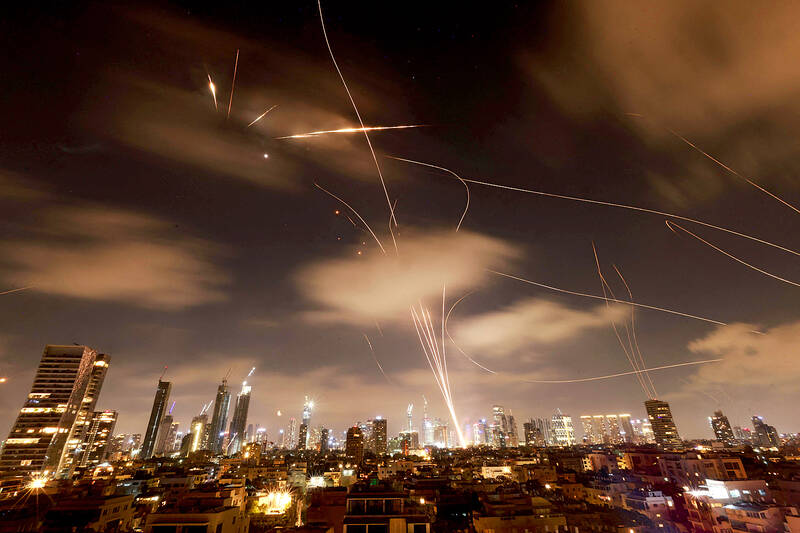Iranian supreme leader Ayatollah Ali Khamenei yesterday said the nation would never surrender as demanded by US President Donald Trump and warned the US it would face “irreparable damage” if it intervenes in support of its ally Israel.
The speech came six days into the conflict, with Trump demanding Iran’s “unconditional surrender,” while boasting that the US could kill Khamenei, fueling speculation about a possible intervention.
The long-range blitz began on Friday, when Israel launched a massive bombing campaign that prompted Iran to respond with missiles and drones.

Photo: AFP
“This nation will never surrender,” Khamenei said in a speech read on state television, in which he called Trump’s ultimatum “unacceptable.”
“America should know that any military intervention will undoubtedly result in irreparable damage,” he said.
Khamenei, in power since 1989 and the final arbiter of all matters of state in Iran, had earlier vowed the country would show “no mercy” toward Israel’s leaders.
The speech followed a night of strikes, with Israeli attacks destroying two buildings making centrifuge components for Iran’s nuclear program near Tehran, the International Atomic Energy Agency said.
“More than 50 Israeli Air Force fighter jets ... carried out a series of airstrikes in the Tehran area over the past few hours,” the Israeli military said, adding that several weapons manufacturing facilities were hit. “As part of the broad effort to disrupt Iran’s nuclear weapons development program, a centrifuge production facility in Tehran was targeted.”
Centrifuges are vital for uranium enrichment, the sensitive process that can produce fuel for reactors or, in highly extended form, the core of a nuclear warhead.
The strikes destroyed two buildings making centrifuge components for Iran’s nuclear program in Karaj, a satellite city of Tehran, the UN nuclear watchdog said.
In another strike on a site in Tehran, “one building was hit where advanced centrifuge rotors were manufactured and tested,” the agency wrote on X.
Iran’s Islamic Revolutionary Guard Corps said they had launched hypersonic Fattah-1 missiles at Tel Aviv.
Hypersonic missiles travel at more than five times the speed of sound and can maneuver mid-flight, making them harder to track and intercept.
No missile struck Tel Aviv overnight, although Israel’s air defense systems activated to intercept missiles over the city.
Iran also sent a “swarm of drones” toward Israel, while the Israeli military said it had intercepted 10 drones launched from Iran.
Trump fueled speculation about US intervention when he made a hasty exit from the G7 summit in Canada, where the leaders of the club of wealthy democracies called for de-escalation, but backed Israel’s “right to defend itself.”
He boasted that the US could easily assassinate Khamenei.
“We know exactly where the so-called ‘Supreme Leader’ is hiding. He is an easy target, but is safe there — We are not going to take him out (kill!), at least not for now,” Trump wrote on his Truth Social platform.
US officials said Trump has not yet made a decision about any intervention.

CHIP WAR: The new restrictions are expected to cut off China’s access to Taiwan’s technologies, materials and equipment essential to building AI semiconductors Taiwan has blacklisted Huawei Technologies Co (華為) and Semiconductor Manufacturing International Corp (SMIC, 中芯), dealing another major blow to the two companies spearheading China’s efforts to develop cutting-edge artificial intelligence (AI) chip technologies. The Ministry of Economic Affairs’ International Trade Administration has included Huawei, SMIC and several of their subsidiaries in an update of its so-called strategic high-tech commodities entity list, the latest version on its Web site showed on Saturday. It did not publicly announce the change. Other entities on the list include organizations such as the Taliban and al-Qaeda, as well as companies in China, Iran and elsewhere. Local companies need

CRITICISM: It is generally accepted that the Straits Forum is a CCP ‘united front’ platform, and anyone attending should maintain Taiwan’s dignity, the council said The Mainland Affairs Council (MAC) yesterday said it deeply regrets that former president Ma Ying-jeou (馬英九) echoed the Chinese Communist Party’s (CCP) “one China” principle and “united front” tactics by telling the Straits Forum that Taiwanese yearn for both sides of the Taiwan Strait to move toward “peace” and “integration.” The 17th annual Straits Forum yesterday opened in Xiamen, China, and while the Chinese Nationalist Party’s (KMT) local government heads were absent for the first time in 17 years, Ma attended the forum as “former KMT chairperson” and met with Chinese People’s Political Consultative Conference Chairman Wang Huning (王滬寧). Wang

CROSS-STRAIT: The MAC said it barred the Chinese officials from attending an event, because they failed to provide guarantees that Taiwan would be treated with respect The Mainland Affairs Council (MAC) on Friday night defended its decision to bar Chinese officials and tourism representatives from attending a tourism event in Taipei next month, citing the unsafe conditions for Taiwanese in China. The Taipei International Summer Travel Expo, organized by the Taiwan Tourism Exchange Association, is to run from July 18 to 21. China’s Taiwan Affairs Office spokeswoman Zhu Fenglian (朱鳳蓮) on Friday said that representatives from China’s travel industry were excluded from the expo. The Democratic Progressive Party government is obstructing cross-strait tourism exchange in a vain attempt to ignore the mainstream support for peaceful development

ELITE UNIT: President William Lai yesterday praised the National Police Agency’s Special Operations Group after watching it go through assault training and hostage rescue drills The US Navy regularly conducts global war games to develop deterrence strategies against a potential Chinese invasion of Taiwan, aimed at making the nation “a very difficult target to take,” US Acting Chief of Naval Operations James Kilby said on Wednesday. Testifying before the US House of Representatives Armed Services Committee, Kilby said the navy has studied the issue extensively, including routine simulations at the Naval War College. The navy is focused on five key areas: long-range strike capabilities; countering China’s command, control, communications, computers, cyber, intelligence, surveillance, reconnaissance and targeting; terminal ship defense; contested logistics; and nontraditional maritime denial tactics, Kilby